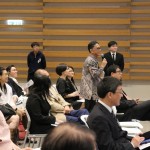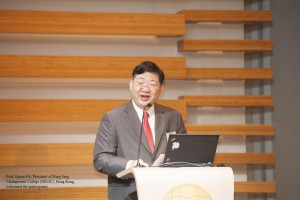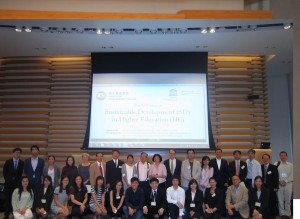 Hong Kong, July, 2015 – “Sustainable development is one of the most important cross-cutting values and principles for all activities of higher education institutions (HEIs), including the three main functions of teaching and learning, research, and social engagement, as well as institutional planning and management”, said Wang Libing, UNESCO, APEID Co-ordinator & Senior Programme Specialist in Higher Education, Bangkok, at the opening of the 1st Forum of the Sustainable Development in Higher Education in Hong Kong. HEIs can apply the values and principles of sustainable development in their social engagement activities, including advocacy and awareness raising activities, technology transfer and incubation activities, and community engagement and empowerment activities.”
Hong Kong, July, 2015 – “Sustainable development is one of the most important cross-cutting values and principles for all activities of higher education institutions (HEIs), including the three main functions of teaching and learning, research, and social engagement, as well as institutional planning and management”, said Wang Libing, UNESCO, APEID Co-ordinator & Senior Programme Specialist in Higher Education, Bangkok, at the opening of the 1st Forum of the Sustainable Development in Higher Education in Hong Kong. HEIs can apply the values and principles of sustainable development in their social engagement activities, including advocacy and awareness raising activities, technology transfer and incubation activities, and community engagement and empowerment activities.” Hong Kong, July, 2015 – “Sustainable development is one of the most important cross-cutting values and principles for all activities of higher education institutions (HEIs), including the three main functions of teaching and learning, research, and social engagement, as well as institutional planning and management”, said Wang Libing, UNESCO, APEID Co-ordinator & Senior Programme Specialist in Higher Education, Bangkok, at the opening of the 1st Forum of the Sustainable Development in Higher Education in Hong Kong. HEIs can apply the values and principles of sustainable development in their social engagement activities, including advocacy and awareness raising activities, technology transfer and incubation activities, and community engagement and empowerment activities.”
Hong Kong, July, 2015 – “Sustainable development is one of the most important cross-cutting values and principles for all activities of higher education institutions (HEIs), including the three main functions of teaching and learning, research, and social engagement, as well as institutional planning and management”, said Wang Libing, UNESCO, APEID Co-ordinator & Senior Programme Specialist in Higher Education, Bangkok, at the opening of the 1st Forum of the Sustainable Development in Higher Education in Hong Kong. HEIs can apply the values and principles of sustainable development in their social engagement activities, including advocacy and awareness raising activities, technology transfer and incubation activities, and community engagement and empowerment activities.”
“Although many university students have a deeper understanding of sustainability and green campus than in the past, they are still restrained by the narrow mindsets of environmental protection. Many of them still do not see how they can fit into the environment themselves proactively by embracing other social and economic factors” said Professor Simon Ho, President Ho, Hang Seng Management College.
The 1st Forum on Sustainable Development in Higher Education, co-organised by UNESCO-APEID, Bangkok and Hang Seng Management College, was attended by around 90 delegates from different countries, for example, China, France, Indonesia, Malaysia, Singapore, Taiwan, and the United States. Speakers from academia, industry and non-governmental organizations presented their findings and papers that addressed the United Nations (UN) Principles of Responsible Management Education on education for management, programme or module design, technology and learning environment in higher education; and the sustainable development issues of Education for Sustainable Development (ESD) of UNESCO on teaching and learning; for example, climate change, disaster risk reduction, biodiversity, poverty reduction, and sustainable consumption.
The Forum covered the following three areas:
- Sustainable Development in Responsible Management Education for Impacts on Economy, Ecology and Equity of Communities;
- Sustainable Development in Programmes/Modules Design/Pedagogic
- Reform; and
- Sustainable Development in the Higher Education Environment
Speakers showed the participants how innovative teaching methods can change the mindset of educators and industry practitioners in life-long learning and value creation.
Highlights of Speakers
In Session I of Responsible Management Education of the Forum, Mr. Allen Lee, CBE, JP, Hong Kong, Moderator of the Forum mentioned that “Internet World, Knowledge-based Society, Competitiveness in Human Beings” were the key elements in 21st century.
Prof. Ei-Ichi, Nobel Prize Winner of 2010, Professor in Purdue University, US / an interviewee of the 1st Forum on Sustainable Development in Higher Education, also shared his idea on sustainable development. “What we need to do is learning how to recycle CO2 as plants do in nature. When I suggested that to a major research team in Japan 4 years ago, I said reduction, economical catalytic reduction of CO2, not to minimize this global warming emission, but to convert them into very useful raw material, for producing all kinds of organic compounds, food item, clothing items, building materials, you name it.”
In the closing session, Dr. Shirley Yeung, Centre for Corporate Sustainability and Innovations of HSMC, introduced the Innovative Business Awards 2016 and Innovative Community Award 2016 sponsored by Fuji Xerox (Hong Kong) Limited and World Plaza Engineering Ltd. that welcome students’ participation.
The 1st Forum of Sustainable Development in Higher Education co-organised by UNESCO, APEID and Hang Seng Management College (HSMC), supported by the Centre for Corporate Sustainability and Innovations of HSMC opened up on-going dialogues and promoted global, regional and local co-operation among educators, industry practitioners and industry practitioners to promote sustainable development in higher education.
More on the conference: http://sdhe2015.hsmc.edu.hk
Media queries: Please contact Shirley Yeung, Director, Centre for Corporate Sustainability and Innovations, Hang Seng Management College, Hong Kong, ccsi@hsmc.edu.hk
Source: www.hsmc.edu.hk
“Although many university students have a deeper understanding of sustainability and green campus than in the past, they are still restrained by the narrow mindsets of environmental protection. Many of them still do not see how they can fit into the environment themselves proactively by embracing other social and economic factors” said Professor Simon Ho, President Ho, Hang Seng Management College.
The 1st Forum on Sustainable Development in Higher Education, co-organised by UNESCO-APEID, Bangkok and Hang Seng Management College, was attended by around 90 delegates from different countries, for example, China, France, Indonesia, Malaysia, Singapore, Taiwan, and the United States. Speakers from academia, industry and non-governmental organizations presented their findings and papers that addressed the United Nations (UN) Principles of Responsible Management Education on education for management, programme or module design, technology and learning environment in higher education; and the sustainable development issues of Education for Sustainable Development (ESD) of UNESCO on teaching and learning; for example, climate change, disaster risk reduction, biodiversity, poverty reduction, and sustainable consumption.
The Forum covered the following three areas:
- Sustainable Development in Responsible Management Education for Impacts on Economy, Ecology and Equity of Communities;
- Sustainable Development in Programmes/Modules Design/Pedagogic
- Reform; and
- Sustainable Development in the Higher Education Environment
Speakers showed the participants how innovative teaching methods can change the mindset of educators and industry practitioners in life-long learning and value creation.
Highlights of Speakers
In Session I of Responsible Management Education of the Forum, Mr. Allen Lee, CBE, JP, Hong Kong, Moderator of the Forum mentioned that “Internet World, Knowledge-based Society, Competitiveness in Human Beings” were the key elements in 21st century.
Prof. Ei-Ichi, Nobel Prize Winner of 2010, Professor in Purdue University, US / an interviewee of the 1st Forum on Sustainable Development in Higher Education, also shared his idea on sustainable development. “What we need to do is learning how to recycle CO2 as plants do in nature. When I suggested that to a major research team in Japan 4 years ago, I said reduction, economical catalytic reduction of CO2, not to minimize this global warming emission, but to convert them into very useful raw material, for producing all kinds of organic compounds, food item, clothing items, building materials, you name it.”
In the closing session, Dr. Shirley Yeung, Centre for Corporate Sustainability and Innovations of HSMC, introduced the Innovative Business Awards 2016 and Innovative Community Award 2016 sponsored by Fuji Xerox (Hong Kong) Limited and World Plaza Engineering Ltd. that welcome students’ participation.
The 1st Forum of Sustainable Development in Higher Education co-organised by UNESCO, APEID and Hang Seng Management College (HSMC), supported by the Centre for Corporate Sustainability and Innovations of HSMC opened up on-going dialogues and promoted global, regional and local co-operation among educators, industry practitioners and industry practitioners to promote sustainable development in higher education.
More on the conference: http://sdhe2015.hsmc.edu.hk
Media queries: Please contact Shirley Yeung, Director, Centre for Corporate Sustainability and Innovations, Hang Seng Management College, Hong Kong, ccsi@hsmc.edu.hk
Source: www.hsmc.edu.hk





